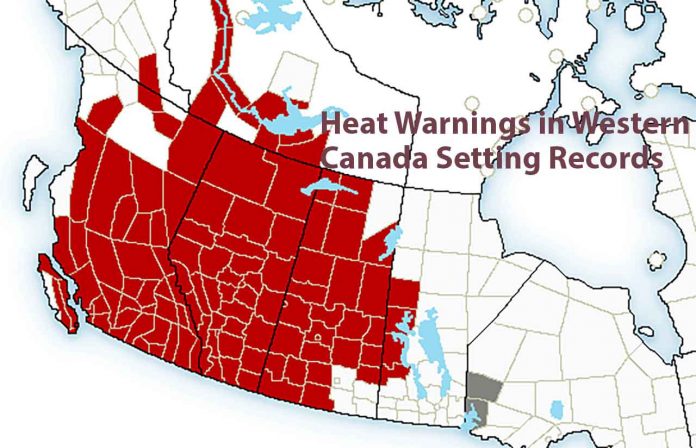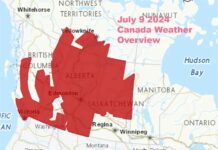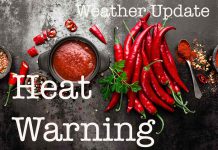Environment and Climate Change Canada’s Meteorological Service are warning Canadians about a dangerous and unprecedented heat wave, which is expected to persist in British Columbia, Alberta, Saskatchewan and parts of the Northwest Territories this week.
This event is already shattering longstanding temperature records, especially in British Columbia.
This severe weather event is bringing record temperatures well above 35°C (some exceeding 45°C) in several areas of western Canada this week.
These extreme daytime highs are expected to persist well above normal right through July 1. Furthermore, the nighttime lows will not drop enough to bring relief to those in the most impacted areas.
Environment and Climate Change Canada is urging western Canadians to heed public health warnings and stay hydrated, avoid spending long periods of time outdoors, seek shelter, and check on neighbours and loved ones who may have pre-existing health conditions that make them more susceptible to heat stroke and heat exhaustion.
On June 28, 2021, Lytton, British Columbia, reached an all-time Canadian heat record of 47.9°C, beating the previous day’s record of 46.6°C. These 2021 heatwave temperatures broke the previous record of 45.0°C set in July 1937, in Saskatchewan.
Other records broken across British Columbia, Alberta, the Yukon and Northwest Territories include 91 daily maximum temperatures and 181 warm overnight low temperatures. Many of these daily records were exceeded by 5–10°C. Some other notable extremes include the following warmest all-time maximum temperatures observed in BC at the following locations:
Cache Creek, BC: 45.0°C (old record 40.1°C in 2015)
Lillooet, BC: 44.8°C (old record 39.8°C in 2015)
Kamloops, BC: 44.0°C (old record 38.2°C in 2015)
Trail, BC: 42.3°C (old record 40.6°C in 2015)
Clearwater, BC: 42.3°C (old record 36.9°C in 2015)
Merritt, BC: 42.2°C (old record 38.0°C in 2015)
Osoyoos, BC: 42.0°C (old record 40.9°C in 2015)
Castlegar, BC: 41.5°C (old record 39.7°C in 2015)
Kelowna, BC: 41.5°C (old record 38.1°C in 2015)
Vernon, BC: 41.5°C (old record 37.3°C in 2015)
The extreme heatwave is caused by a significant atmospheric blocking pattern where a massive dome of hot air, reaching high into the atmosphere, remains stagnant over western North America.
Quick facts
- Additional all-time records were also observed in Alberta on June 28 at:
- Grande Prairie, AB: 38.4°C, replacing 36.1°C on June 27 (old record 29.3°C in 2006)
- Hendrickson Creek, AB: 35.7°C, replacing 34.5°C on June 27 (old record 29.2°C in 2015)
- Jasper, AB: 39°C, replacing 37.3°C on June 27 (old record 34.4°C in 1925)
- Nordegg, AB: 32.6°C set June 27 (old record 29.5°C in 2006)
- And in the Northwest Territories on June 28 at:
- Nahanni Butte, NT: 38.1°C (old record 30.5°C in 2014)
- Fort Providence, NT: 35.6°C (old record 30.6°C in 1943)
- Fort Liard, NT: 35.2°C (old record 29.7°C in 2004)
- Climate change is affecting the frequency, duration and intensity of many climate-related hazards and disasters around the world such as floods, wildfires, droughts and extreme weather events. In Canada, we have already observed more extreme heat. These changes are consistent with what scientists expect as a result of global warming. A warming climate will intensify some weather extremes in Canada. Extreme hot temperatures will become more frequent and more intense. This will increase the severity of heatwaves and contribute to increased drought and wildfire risks. Future changes in extreme weather events underscore the need to better prepare Canadians to adapt and build resilience to extreme weather.
- Extreme heat can cause severe health risks, including illnesses such as heat stroke and even death. It is important to take measures to stay safe during extreme heat. Avoid working or exercising intensely if it is very hot or humid outside, and head for cooler conditions if your body becomes overheated. Watch for signs of serious medical conditions, such as heat exhaustion and heat stroke.
- Canadians are encouraged to consult provincial health agencies for more advice on staying safe during extreme heat events.







